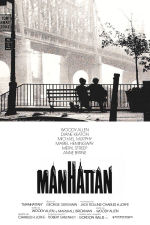|







 
|
 |
Manhattan
(1979)
    
 |
Directed
by:
Woody Allen |
COUNTRY
USA |
|
GENRE
Drama/Comedy |
|
NORWEGIAN TITLE
Manhattan |
|
RUNNING
TIME
96 minutes |
|
|
Produced
by:
Charles H. Joffe |
|
Written by:
Woody Allen
Marshall
Brickman |
Review
Woody Allen's perhaps most outright
love letter to New York City, and his first movie in black-and-white,
is a small-scale comedy/drama with a hint of grandeur in the cinematography
department and the use of George Gershwin's music. Woody plays
Isaac Davis, a 42-year-old writer who just can't seem to find
the right one. His latest ex-wife, played by Meryl Streep,
seems to be inherited from Dustin Hoffman in
Kramer vs. Kramer. And
his most recent conquest is a 17-year-old high school student (Mariel
Hemingway), a relationship he justifies by constantly referring to
her as "too young". Then he meets culture connoisseur Mary (Diane Keaton), and everything seems to click into place. Although, we all know that
nothing ever really does with Woody Allen. And this is of course the
basis for the bittersweet symmetry which has always given his movies a certain
slice-of-life veracity. For that to be true for Manhattan,
however, you'll have to buy into the fantasy that this odd-looking,
bespectacled, middle-aged little man can be the object of attraction
for a
beautiful, modern 17-year-old. But hey, this was the 1970s, and in
retrospect, it is fair to say that Allen with this subnarrative
tapped into a zeitgeist which existed in the wake of the sexual revolution
– arguably
more than what he was aware of himself at the time. There is an undeniable appeal in
watching these fundamentally unjudgmental characters interact – it
vividly illustrates how much the world has changed since 1979,
arguably for both better and worse. But the movie and Isaac's many
relationships and fiddlings with love aren't just a reflection of
the times, they are also a reflection of Woody's hubris. And herein
lies the reason why Manhattan doesn't quite work as the grandiose romantic comedy
Allen set out to make, because running through its down-to-earth
snobbery is a slight but constantly discernible indulgence. A
certainty about its own cleverness and importance which not only
impairs Woody's sometimes brilliant observations and phraseology,
but also makes you aware of the story's inherent mediocrity.
|
|